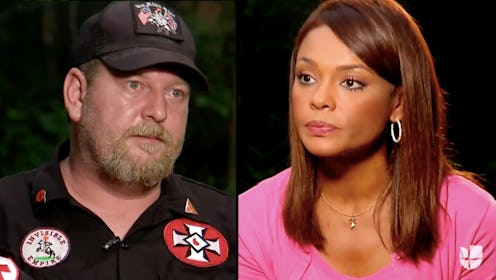Life
This Black Latina Journalist “Felt Scared And Unsafe” When She Was Sent To Interview The KKK
Since the beginning of Trump's presidency, the conversation around white supremacy across the United States has been increasing, and media outlets are responding accordingly. In July, before the white supremacist march in Charlottesville that ended in the murder of Heather Heyer by a far-right extremist, Univision sent a Black Latina journalist to interview a Ku Klux Klan member for an episode of the show Aquí y Ahora. The journalist, Ilia Calderón, who is a U.S. immigrant with both Black and Colombian heritage, opened up to press that the subject, Imperial Dragon Chris Barker, threatened her so openly on camera that she was afraid for her personal safety.
The excerpts released by Univision show Barker asking Calderón why she doesn't go back to where she came from, calling her the n-word and a "mongrel," and telling her that she, and the other 11 million immigrants in America, would be "burnt out" by white supremacists. "We killed 6 million Jews last time. 11 million is nothing," Barker said to her on camera.
Calderón was apparently shocked. “My team told me that I would be insulted, and I knew, but I never imagined the level," she told Univision. “At that time I was really felt very afraid for my safety and the safety of my team." Bustle has reached out to Univision for comment, and we will update this post if and when we here back.
Calderón has discussed racial discrimination openly before. In 2015, Univision anchor Rodner Figueroa was fired for comparing Michelle Obama to an ape, and Calderón responded to the controversy by posting an open letter about how to educate her multiracial child about the realities of racist and sexist microaggressions, cataloging everything from stereotypes about women driving to "judging Indians by how they smell." "Every day," she wrote, "I confirm why I also have to teach [my daughter] how to respond with dignity to those who want to hurt her because of what they see on the outside. Double the task. Prepare her to be an exemplary person and prepare her to confront those who are not."
The interview with Barker is a clear example of that kind of confrontation, and it also it raises bigger questions. Should it be the responsibility of Calderón, or of other non-white women, to step into spaces where their personal safety is threatened in order to show the reality of white supremacy? Or is it simply another way in which people of color are expected to do complicated emotional work at their own personal cost?
It's unclear how the decision was made to position Calderón as Barker's interviewer. But even if Calderón readily consented to the interview as a professional (or suggested it herself), it feels uncomfortably as though Univision are using her, as a woman of color, to provoke a response from the hate group, with her direct endangerment as a result.
Calderón, as a Black Latina journalist, was explicitly put in a position where she'd be verbally abused and made afraid for her life, and expected to remain "professional" and engaged, rather than simply exiting the situation. The cost of this serious emotional labor (the management of feelings by women, particularly in people-facing positions, for the sake of making others comfortable) was her own sense of security. Was she asked to pay that cost for the sake of a scoop, and how comfortable was she in paying it?
The issue of media interaction with white supremacists is complex. Sending a white or non-multiracial interviewer might have led Univision to be accused of pandering to Barker in order to make him more "comfortable." And confrontation with his worst nightmare — an articulate, confident, professional, Black and Latina female immigrant — definitely created conditions for Barker to be violently truthful about his beliefs (though one can argue that somebody who identifies publicly as a KKK Imperial Dragon doesn't need to be prodded to reveal their beliefs). But while watching the footage, it's important to remember why Calderón isn't obligated to put her own safety on the line to delve into violent hate for us all to see.
